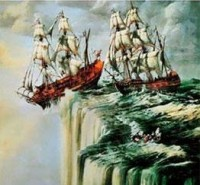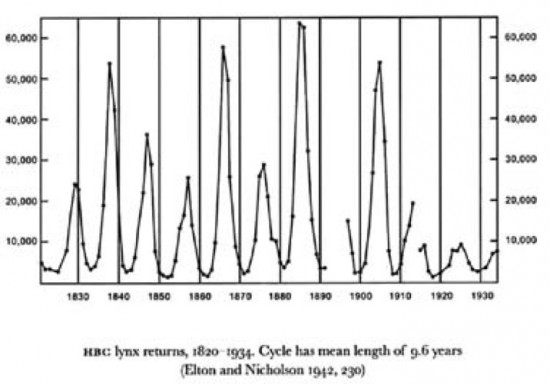 The opening headlines of a web site claims: “We must act now – together. Extinction is our choice, unless within the next 8 years we have stopped using fossil fuels, planted millions of trees, ended logging, and prepared our cities and agriculture for the inevitable sea rise. Otherwise our children may not survive.”
The opening headlines of a web site claims: “We must act now – together. Extinction is our choice, unless within the next 8 years we have stopped using fossil fuels, planted millions of trees, ended logging, and prepared our cities and agriculture for the inevitable sea rise. Otherwise our children may not survive.”
It is not written by extremists, but by people who clearly don’t understand science or the patterns of nature. Why are they and others making so much noise about “tipping points”?
The hypothesis that dangerous human-caused climate change will create rapid change beyond the adaptive capacity of human society and natural systems is based on two fallacies. First, that climate change has not occurred before: an idea that only works because the public generally understands that it’s caused by humans and therefore can be stopped. Second, when it occurred it was very gradual over long periods. It allowed Phil Jones and the Climatic Research Unit (CRU), through the Intergovernmental Panel on Climate Change (IPCC), to present false evidence that recent temperature change was greater in degree and speed than could occur naturally.
Uniformitarianism
Western science views natural ecosystems from the philosophical basis of uniformitarianism. This view came from the work of Charles Lyell (1797-1875) and served as an underpinning for Darwin’s Theory of Evolution. Darwin took Lyell’s famous work “Principles of Geology” with him on the voyage of the Beagle during which the theory was formulated and evidence procured. Uniformitarianism is the concept that change is gradual over long periods of time. It prevails today.
There were a couple of challenges along the way. An important one by Stephen Jay Gould was called punctuated equilibrium. This argues that a relatively stable situation exists, but is periodically interrupted by a catastrophic event that destabilizes everything until a new equilibrium is established. Gould published his ideas in academic journals but also took it to the public forum: like Galileo who published in Italian rather than Latin. This did not prevent attacks from academics like committed Darwinist Richard Dawkins who said punctuated equilibrium was, ““an interesting but minor wrinkle on the surface of neo-Darwinian theory”. Gould raised even more questions about the rapidity and pattern of evolution in his book “Wonderful Life”.
In reality rapid and significant change is the norm. Even a cursory study of climate illustrates this idea. For example, just 20,000 years ago extensive ice sheets covered large parts of the world. One equal in area to the current Antarctic ice sheet covered over half of North America. Almost all the ice melted in approximately 5000 years. As the ice melted sea level rose 150 m in approximately 8000 years.
Natural ecosystems and animal populations go through boom or bust patterns in response to climate cycles. Among the first to study the relationships was Charles Elton who showed the pattern of fluctuating numbers of predators using the Lynx. There are collapses but there are also built in recovery strategies. Figure 1 is a plot of population fluctuations of lynx produced by Elton and Nicholson.

Figure 1: Fluctuation of Lynx numbers over 114 years.
People Are To Blame
In the 1980s, US Great Plains and Canadian Prairie farmers were accused of causing a decline in waterfowl populations. Environmentalists said they had cut the woodlands, drained the wetlands and used chemicals. In fact, the birds altered their migration routes to the west as winds that accompanied a drought pattern changed. There were no apologies when wind patterns changed, the drought ended and the birds returned in record numbers. Environmentalists sitting in cities point fingers in order to achieve a political agenda. They should listen to earlier people who understood nature and knew what was happening. The April 28th, 1773, entry for the Hudson’s Bay Company journal at Churchill notes, “Indians general complaint that a very great part of the country inland (the Great Plains) has been on fire the last summer it being so very a dry one to which the natives compute the scarcity of animals.” Droughts occur approximately every 22 years on the Great Plains and are well documented in tree rings and other sources. It’s a problem that people don’t realize the natural cycles and how they ebb and flow. However, it is seriously aggravated by environmentalists who exploit the lack of knowledge and force politicians to inappropriate reactions always at the expense of the economy and people.
Roger Pocklington, a Canadian oceanographer and climatologist studied water temperatures from Newfoundland to Bermuda. A hero in the 1970s when cooling was the consensus because he showed water temperatures falling. He was amused when the climate consensus shifted to warming and he was an outsider because the water temperatures continued to decline. With the decline cod began to disappear. We discussed the climatic reasons for the decline, which were very cold decades in northeastern North America and changes in wind patterns pushing cold dense waters of the Labrador Current much further south into the cod fishing grounds of the Grand Banks. We were concerned about decline in the number of cod as water temperatures fell, but the standard now was to blame humans.
Government only considered over-fishing as the cause and closed the fishery. It is fourteen years on and the fish stay away despite going through three cycles because water temperatures remain low. If it was over-fishing recovery would be in progress; their absence is proof of temperature being the major factor. Closing the cod fisheries in Newfoundland was akin to banning corn production in Iowa. The economy was disrupted and would have been devastated except ironically, it was those evil oil companies that saved the day. Discovery of massive deepwater oil deposits at Hibernia boosted the economy and papered over the impact. Thousands of Newfoundlanders also migrated to the newly expanding Athabasca Tar Sands. Meanwhile a traditional economy and lifestyle are gone, but without the oil they are devastated.


